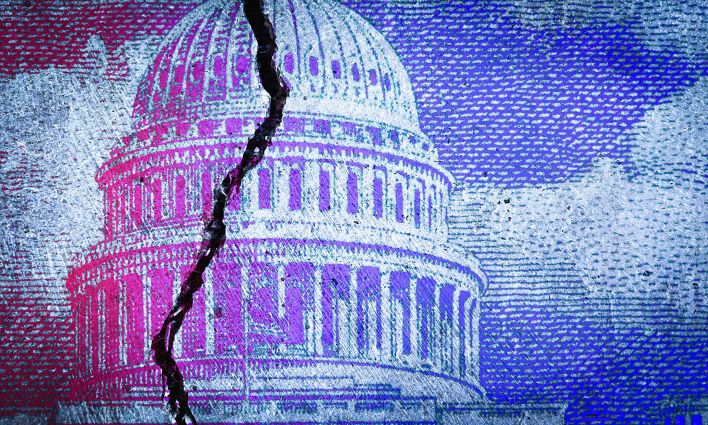As a dentist, and an open advocate for public dental care, I often speak to other dentists about the issue. Recently, I’ve started hearing a new type of story—dentists receiving threatening phone calls from their colleagues in the industry, intimidating them with threats to stop sending them referrals if they participate in the federal government’s public dental insurance program.
It’s a symptom of a larger problem. As the feds prepare to roll out dental coverage for low- and middle-income Canadians, this type of behavior—which dovetails with dentists’ associations opposition to the plan—threatens to torpedo what would be the largest expansion of health coverage in decades.
Poor oral health worsens type II diabetes and heart disease, while also increasing rates of aspiration pneumonia. Having missing front teeth or visible decay affects self esteem and employability. Dental infections can also lead to life threatening infections. For these reasons and more, people are eagerly waiting for the Canadian Dental Care Plan (CDCP).
The CDCP seeks to provide dental insurance to those without private insurance and with a family income of less than $90,000 per year, with copayments increasing as annual income goes above $70,000. The CDCP is expected to cover 8.5 million people and marks the largest investment in dental care in Canadian history. While not perfect—as millions will be left uninsured and many more struggling to make their copayments under public or private insurance—it is a long overdue step towards treating dental care as healthcare. However, the question on the mind of many people gaining coverage through the CDCP is “am I going to be able to find a provider?”
Approximately 11,000 oral health providers have signed up for the CDCP—around a third of the total. When we look at provider type, we see that independent dental hygienists and denturists have been far more likely to sign up than dentists. Considering the messaging from the associations representing each of these groups, it is not surprising to see the disparity in providers signing up.
The first day of the CDCP, the Canadian Dental Hygienists Association said this is a “historic day for oral health of Canada’s most vulnerable populations”. In an email to its members, the Denturists Association of Canada “proudly expresses its support for the CDCP, a groundbreaking initiative by the Government of Canada”. While groups representing dental hygienists and denturists have had an overall positive view of the CDCP, they have not shied away from effectively expressing their concerns.
The Canadian Dental Association (CDA), on the other hand, has spoken very poorly of the CDCP from the beginning. In June 2022, shortly after a federal plan was announced, the CDA was already referring to the plan in a newsletter to dentists as “a one-size-fits-all approach [that] has many drawbacks, such as jeopardizing access to dental care for millions of Canadians.” Before any details of the program were worked out, the CDA and the provincial counterparts already made up their mind about the new program.
In March 2024, the president of the CDA repeated "I am concerned that this plan was born of politics, not policy. And I fear that if it's rushed, that it won't be so simple to get it right." With 18 months before the next federal election, and all polls showing a Conservative majority is likely, delaying the CDCP any more would mean the program would not come to fruition.
Even though the federal government is going ahead with the CDCP, the dental associations are still using their leverage to harm the program. In April 2024, the Nova Scotia Dental Association (NSDA) said to its members “while dental sign ups for the CDCP are now open, there is no need for dentists to take action at this time. The NSDA advises members not to agree to any terms without having all of the facts.” In May, the NSDA affirmed to its members that they will “continue to withhold support for CDCP.” All of the provincial dental associations share these messages.
As a dentist, I can tell you we’ve had enough information to sign up for months now. But the dental associations are aware that if dentists do not sign up for the CDCP, the program will be a failure and it will be easier for the Conservatives to cut the program, in whole or in part. Two dentist colleagues of mine even reached out to tell me that the president of one of the provincial dental associations outright said that this was their strategy at a conference.
In April 2024, a prominent dental magazine had an article titled: “Why the Canadian Dental Care Plan doesn’t work and will hurt dentistry.” The opposition from the dental associations has created space for misinformation to the CDCP to spread amongst the dental community.
Considering dental associations and these magazines are where dentists get most of their information on the CDCP from, it is no wonder so many are hesitant to sign up for the program. Dentists have been told that they will lose money and drown in paperwork if they sign up for the program, but this is not true.
The Nova Scotia Dental Association stated to their members that the CDCP fee guide is on average 88.6 percent of their fee guide—but dentists can charge patients the difference between this and their normal fees. In other words, for a procedure that costs $100 on average in Nova Scotia, the CDCP will cover $88.60, and the dentist is still free to charge $11.40 to the patient—or even more.
CDCP coverage is far more comprehensive than any provincial program, and has an administrative process very similar to private insurance plans, which dental clinics are already set up to accept. I have received payment for my CDCP patients quicker than I do those with private insurance.
It is time organized dentistry take their professional responsibility seriously, and stop swaying dentists away from the CDCP. But I won’t hold my breath. There is a long history of organized dentistry opposing public dental care—much like how physicians opposed universal healthcare when it was first rolled out.
In Saskatchewan in the 1980’s, organized dentistry successfully lobbied to dismantle the most successful children’s dental program in North American history. Now children’s oral health in the province is suffering.
Once we understand this phenomenon, we start to see how the Canadian Dental Care Plan was disadvantaged from the beginning. The CDCP was designed to give dentists what they have said they want from a public dental program, but it ignored the possibility that organized dentistry actually does not want public dental care at all. The federal government should have designed a plan that gave them leverage to make organized dentistry negotiate in good faith.
If the federal government built a public delivery model into the CDCP—by directly hiring dentists and other dental providers to work in publicly owned dental clinics, rather than simply covering the costs of private care—patients who gained coverage but could not find a dentist in private practice could still be seen. Since organized dentistry has a history of opposing public delivery of dental care, they are more likely to negotiate in good faith out of concern of this public delivery model being scaled up if private dentists do not sign up for the program.
I have a lot of respect for my colleagues that have signed up for the CDCP, but the reality is that all dental providers need to participate in this program to make it a success. Every Canadian deserves access to dental care, but for now corporate interests are still the priority. I look forward to a day where we can finish Tommy Douglas’s dream of including dental care in our universal healthcare system.







